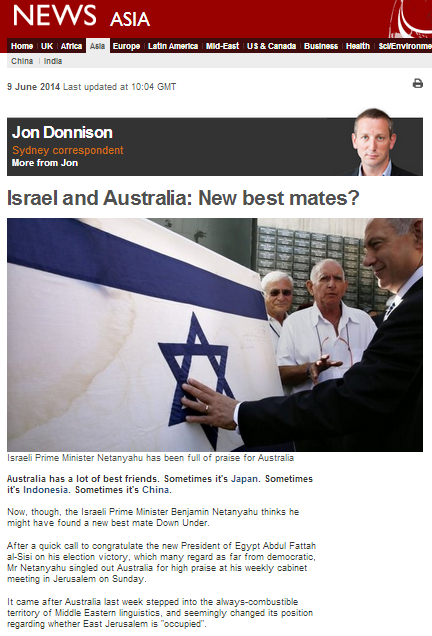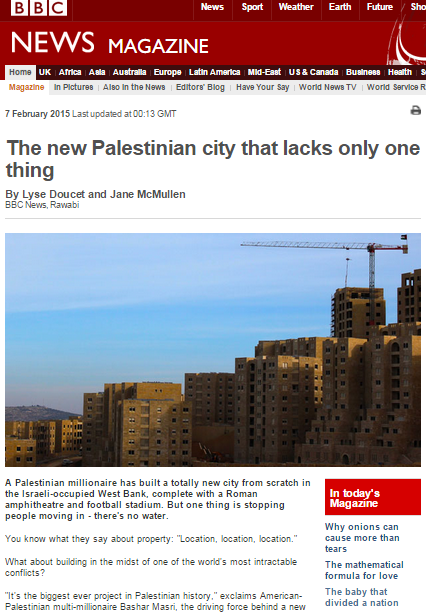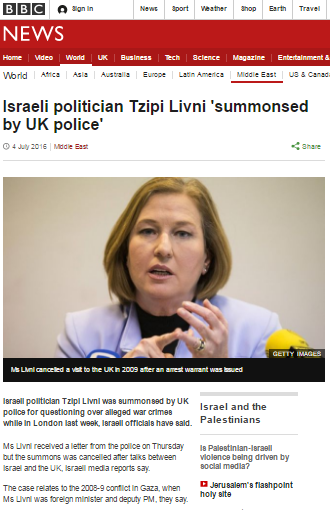The BBC’s former Gaza Strip and West Bank correspondent Jon Donnison was back on the BBC News website’s Middle East page (and Asia page) on June 9th with an article titled “Israel and Australia: New best mates?” in the ‘Features & Analysis’ section.
Readers who are wondering about the connection between the image used to illustrate that article and the obviously unconnected caption appended by the BBC may be interested to learn that the original photograph was captioned as follows:
“Israeli Prime Minister Benjamin Netanyahu touches the original flag Israeli paratroopers waved at the Western Wall during the 1967 Middle East War, before a special cabinet meeting marking Jerusalem Day at Ammunition Hill in Jerusalem May 28, 2014.”
Donnison begins by implying that there is something untoward about the fact that the Israeli prime minister congratulated Egypt’s new president on his win of elections which Donnison appears to believe lack legitimacy.
“After a quick call to congratulate the new President of Egypt Abdul Fattah al-Sisi on his election victory, which many regard as far from democratic, Mr Netanyahu singled out Australia for high praise at his weekly cabinet meeting in Jerusalem on Sunday.”
Of course President Sisi also received congratulations from many other nations, including the US, the UK, Saudi Arabia and China, but that point does not seem to concern Donnison quite as much.
Next Donnison moves on to the real topic of his article: the recent statement by Australia’s Attorney General on the issue of the use of the term ‘occupied’ to describe specific neighbourhoods of Jerusalem. Donnison, however, only quotes part of the statement:
“Last week the Australian Attorney General George Brandis issued a statement saying: “The description of East Jerusalem as ‘Occupied East Jerusalem’ is a term freighted with pejorative implications which is neither appropriate nor useful.” “
That quoted line would of course have been better understood by BBC audiences were it placed within the context of the words coming before it:
“Australia supports a peaceful solution to the dispute between Israel and the Palestinian people, which recognises the right of Israel to exist peacefully within secure borders and also recognises the aspiration to statehood of the Palestinian people,” Senator Brandis said.
”The description of areas which are subject to negotiations in the course of the peace process by reference to historical events is unhelpful.
”The description of East Jerusalem as ‘Occupied East Jerusalem’ is a term freighted with pejorative implications, which is neither appropriate nor useful.”
Jon Donnison, however, is apparently of the opinion that the Australian government is incapable of deciding on its approach to this subject all by itself and so he goes on to provide readers with obviously speculative ‘explanations’ for the Attorney General’s statement which involve “extreme right-wing Israeli lobbyists” who have “influence”.
“Australia’s support for Israel is contentious here.
The former Labor Foreign Minister Bob Carr has recently said that extreme right-wing Israeli lobbyists here had an extraordinary influence on Australian policy in the Middle East under former Prime Minister Julia Gillard that he regarded as “very unhealthy.”
Mr Carr’s comments were strongly criticised by the Israeli government and some of the country’s supporters.
Why Australia has chosen now to change its position is not clear.
It’s possible Mr Brandis was speaking off the cuff or out of turn, but the clarifying statement suggests not.
The country has a relatively small Jewish population of about 100,000 (0.4% of the total).
The Arab population is much larger: roughly 300,000 people, mostly of Lebanese origin, but including around 7,000 Palestinians.
Israel’s critics will say the change on policy shows the influence of the lobby group Mr Carr talked about.”
As someone who spent over three years reporting from the Middle East, Donnison should be capable of avoiding the breaches of accuracy and impartiality evident in other parts of this article.
“Jerusalem is at the heart of the Middle East’s most intractable conflict between Israelis and Palestinians.”
Donnison provides no evidence for his claim that the Palestinian-Israeli conflict is “the [..] most intractable” in the Middle East or that it is any more intractable than, say, that between Sunni and Shi’a which has been going on for considerably longer and with much more lethal consequences.
“Israel captured East Jerusalem along with Gaza, the West Bank, the Golan Heights and the Sinai Peninsula during the 1967 Six Day Arab Israeli war.”
Donnison fails to provide any context to that statement and of course neglects to inform readers that the eastern part of Jerusalem was only separated from the rest of the city for the 19 years of the Jordanian occupation and that its later annexation by Jordan was not recognized by the international community. Likewise, he fails to inform audiences that Jerusalem, Judea & Samaria and the Gaza Strip are all areas designated for the creation of the Jewish homeland under the terms of the Mandate for Palestine.
Next comes a statement which must have crept past the BBC editorial checks.
Donnison cites assorted countries and organisations in order provide backing for the viewpoint he wishes to promote, but fails to meet BBC editorial guidelines on impartiality by informing readers of opposing opinions.
“Almost the entire international community, including the United States, does not recognise Israel’s annexation of East Jerusalem
The United Nations and the International Court of Justice regard East Jerusalem as occupied territory.
President Obama has called for the ending of “the occupation, which began in 1967″. Although in his speech to the United Nations General Assembly he did not specify if he was referring to East Jerusalem.”
He then goes on to state:
“The United States, European Union and the United Nations all believe a future Palestinian state should be based around the pre-1967 borders.”
There is, of course, no such thing as “pre-1967 borders” because – as Donnison surely should know – the 1949 Armistice lines were not borders, as the agreement which created them specifically states. [emphasis added]
“Article II
With a specific view to the implementation of the resolution of the Security Council of 16 November 1948, the following principles and purposes are affirmed:
1. The principle that no military or political advantage should be gained under the truce ordered by the Security Council is recognised;
2. It is also recognised that no provision of this Agreement shall in any way prejudice the rights, claims and positions of either Party hereto in the ultimate peaceful settlement of the Palestine question, the provisions of this Agreement being dictated exclusively by military considerations.”
“Article VI
8. The provisions of this article shall not be interpreted as prejudicing, in any sense, an ultimate political settlement between the Parties to this Agreement.
9. The Armistice Demarcation Lines defined in articles V and VI of this Agreement are agreed upon by the Parties without prejudice to future territorial settlements or boundary lines or to claims of either Party relating thereto.”
Donnison’s inaccuracies are outdone only by his lack of impartiality in what is a blatantly political polemic barely disguised as ‘analysis’.




